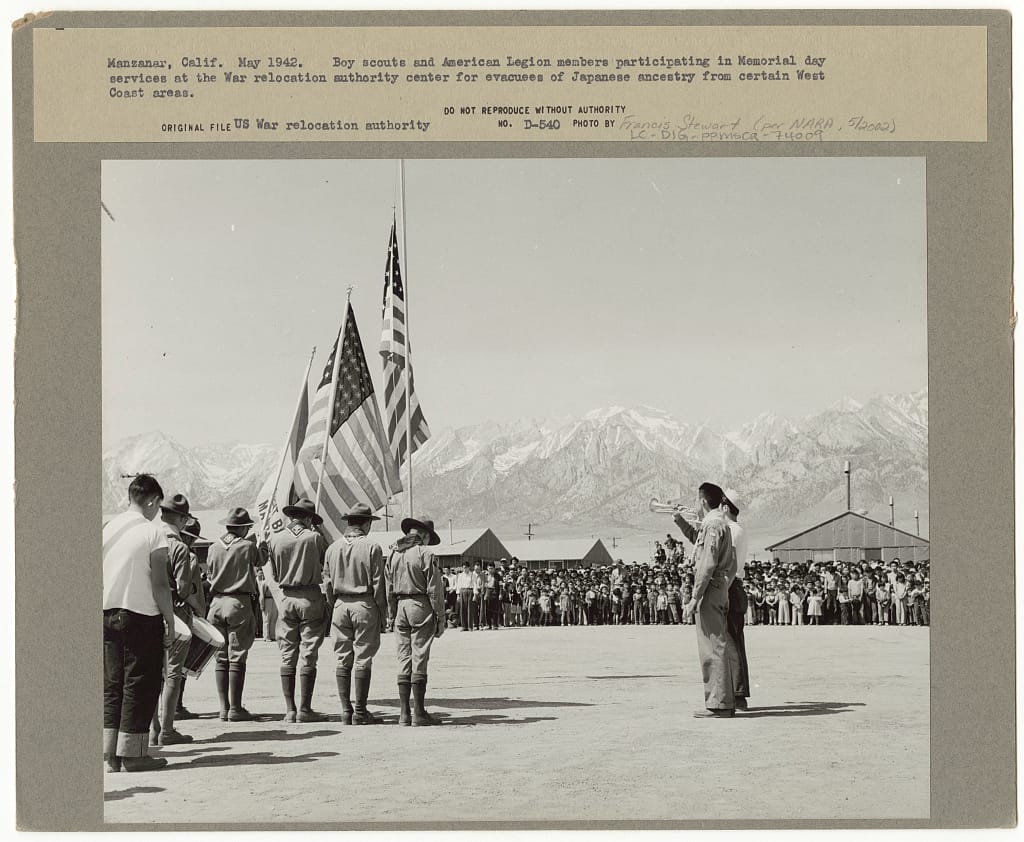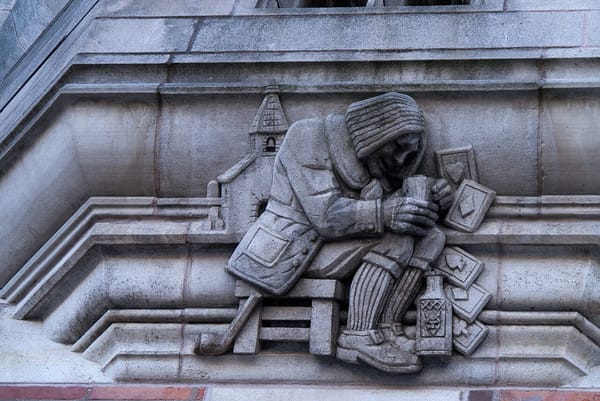Trump's Lawlessness Has Historical Roots
Donald Trump is heir to a long tradition of presidential misuse of federal powers and personnel against American citizens.

It would be comforting to think that Donald Trump's current streak of unlawful acts—his search-seize-deport operations under the Alien Enemies Act, his slew of executive orders targeting law firms, universities, and even individual Americans—are somehow, like the man himself, a type of once-in-a-lifetime political nightmare and aberration. In some key respects, that's true. No president in the history of the Republic has issued so many facially unconstitutional executive orders or so brazenly defied federal courts, including the Supreme Court.
However, labeling Trump as the only chief executive to engage in demonstrably unconstitutional or otherwise unlawful acts would be historically inaccurate. A key difference between those past episodes and Trump's current activities is that federal courts and Congress have often aided and abetted such outrageous presidential behavior throughout our nation's history.
Many repressive legislative, judicial, or presidential acts have occurred over our country's 250-year history in the name of "national security."
America's new constitution was barely a decade old when Congressional Federalists and their party leader, President John Adams, gave us the infamous Alien and Sedition Acts. As is now well known, Trump is using one of those laws, the Alien Enemies Act, to fast-track without due process the deportation of individuals his regime claims are dangerous Latin American gang members or otherwise undesirable illegal migrants.
Abraham Lincoln had no constitutional authority to suspend habeas corpus during the Civil War—but Congress retroactively blessed his invocation of it anyway.
During World War I, the Supreme Court upheld convictions of opponents of the war under the Espionage Act despite the law's clear trashing of the plain language of the First Amendment.
Franklin Delano Roosevelt's infamous Executive Order 9066, which authorized the creation of military exclusion zones, was used to round up and put in concentration camps over 100,000 Japanese Americans in the wake of Imperial Japan's attack on Pearl Harbor. That act of mass incarceration of Americans guilty of no crime, driven entirely by nativist racism, was upheld as constitutional when challenged by several Japanese American victims of the policy.
It would not be until the June 2018 case of Trump v. Hawaii that the Supreme Court would repudiate the earlier Court's decision, declaring that "The forcible relocation of U. S. citizens to concentration camps, solely and explicitly on the basis of race, is objectively unlawful and outside the scope of Presidential authority."
The Supreme Court's repudiation of race-based, due process-free detention in the Trump v. Hawaii case represented a long overdue judicial "do-over" on protecting basic constitutional rights.
But what the Court's majority continued to embrace was the Administration's assertions of "national security" concerns—only superficially examined by the Court itself—about admitting persons from targeted countries. The Court's majority asserted that from a statutory standpoint, Trump's revised ban fell wholly within the authority delegated to the chief executive by Congress. While perhaps true from a purely legal and technical standpoint, the actual motivations for the ban seemed more fundamentally bigoted from an ethnic and religious standpoint: six of the eight countries subject to the ban were majority Muslim nations.
It's worth noting that in the Japanese American internment action, FDR elected to ignore two separate intelligence assessments—one from the Office of Naval Intelligence, the other from his own private spymaster, John Franklin Carter—that Japanese Americans not only presented no national security threat but were likely to be overwhelmingly loyal to the United States in the event of war with Imperial Japan. As I recount in The Triumph of Fear: Domestic Surveillance and Political Repression from McKinley through Eisenhower, the Roosevelt administration never shared that information with federal courts, including the Supreme Court, when the various challenges to the internment policy were being litigated.
This and many other historically documented examples of executive branch officials playing fast-and-loose with the truth, or even outright lying to or withholding information from federal courts, is why giving the benefit of the doubt to government officials and their declarations is a practice that needs to go the way of the dinosaurs.
During his second term, Trump's radical and sweeping attempts to assert presidential authority where he clearly has none present the federal judiciary and the Congress with an opportunity to finally repudiate the decades-old judicial canards that presidents are entitled to "deference" in matters of national security and that there should be a "presumption of regularity" in their declarations and actions.
One change that courts themselves could undertake would be to require hard, documentary evidence from executive branch officials that an alleged harm has an actual factual basis. The use of in camera review, particularly in national security cases, has been available as a tool to judges for decades, but the court-created doctrine of judicial deference to the executive branch has generally discouraged judges from using it. Congress could mandate such in camera reviews in cases implicating constitutional rights, including immigration cases.
However, Trump's success thus far in causing a demonstrable breakdown in the constitutional order is not exclusively of his own making. He's had lots of help, and not just from his sycophantically loyal political appointees like Attorney General Pam Bondi or the GOP-controlled Congress.
Trump's defiance of federal courts in the Alien Enemies Act case and others dealing with his attacks on major law firms, universities, and other institutions and persons can only be successful if thousands of lawyers and federal agents in the Justice and Homeland Security departments carry out his unconstitutional edicts.
And so far, thousands of those federal employees have done exactly that.
Trump's well-documented personnel purges at the FBI have no doubt had a chilling effect—and in some cases a "head for the exits" effect—on career Justice Department and FBI lawyers and agents. But for those who've chosen to stay, this fact remains: they took an oath not to Donald Trump, but to preserve, protect, and defend the Constitution of the United States and to faithfully execute the laws thereof. And while the Supreme Court's ill-considered presidential immunity decision last year in Trump v. U.S. might shield Trump from subsequent prosecution for his unconstitutional conduct, it would provide no protection for federal employees who follow his illegal orders.
Additionally, congressional Democrats are not powerless to stop Trump's attempts to destroy the Republic.
House Democrats could introduce impeachment resolutions against Trump and every other person in the federal government responsible for acts deemed unconstitutional or otherwise illegal by federal courts, tying the House of Representatives in knots by forcing vote after vote on impeachment resolutions. Senate Democrats could, acting as a bloc, bring the Senate to a halt by refusing unanimous consent on any legislation or Trump nominees until he ceases his illegal acts.
But in addition to taking actions in the here and now to try to forestall as much damage as possible flowing from Trump's toxic actions and policies, Democrats and everyone else committed to the preservation of the Republic need to have a forward-looking, actionable agenda.
It needs to be bold and designed to make it impossible for any would-be authoritarian who might follow Trump to pick up where he left off.
It must also be a program that recognizes that our current crisis was made possible by a flawed constitutional design—a flaw that can only be remedied by amending the Constitution itself.
The error the Founders made was in placing the law enforcement function—which should be a politically neutral governmental undertaking—within an inherently political branch of government: the executive branch.
As documented by myself and others over the past several decades, the episodes involving presidential misuse of federal law enforcement and intelligence powers and personnel against American organizations and citizens, including a president's political opponents, are far too numerous to list here. What they speak to is the refusal of successive presidents—Republican and Democrat—to restrain their most base impulses to use federal power against those they deem a threat to their agenda. Four months into his second term, Donald Trump is now the presidential poster child for why such power should never be vested in one person ever again.
The solution is a constitutional amendment that would move all domestic law enforcement functions and power from the executive branch to the judicial branch, and at the same time make explicitly clear that any elected official—especially the president—is just as subject to the law as anyone else, whether while in power or after vacating the Oval Office.
A president's Article II powers as commander in chief of the armed forces and America's foreign policy leader would remain largely unchanged, with the exception of prohibiting the president from unilaterally federalizing the National Guard. Under my amendment concept, such federalization would require the explicit written approval of a state's governor.
As is no doubt obvious, this represents both a massive change and politically, a very heavy lift. It is also the only solution I've come up with that would actually eliminate the constitutional infirmity that ultimately made Donald Trump's rise and burgeoning reign of terror possible. A single House or Senate member introducing such a constitutional amendment could get the process started, and equally urgently, ignite a national conversation about the imperative need for such change.
The Republic can in fact be saved, but it will take far more than harsh language to do it.
Featured image is "Manzanar, Calif. May 1942. Boy Scouts and American Legion members participating in Memorial Day services at the War Relocation Authority center for evacuees of Japanese ancestry from certain West Coast areas," Francis Stewart 1942.




